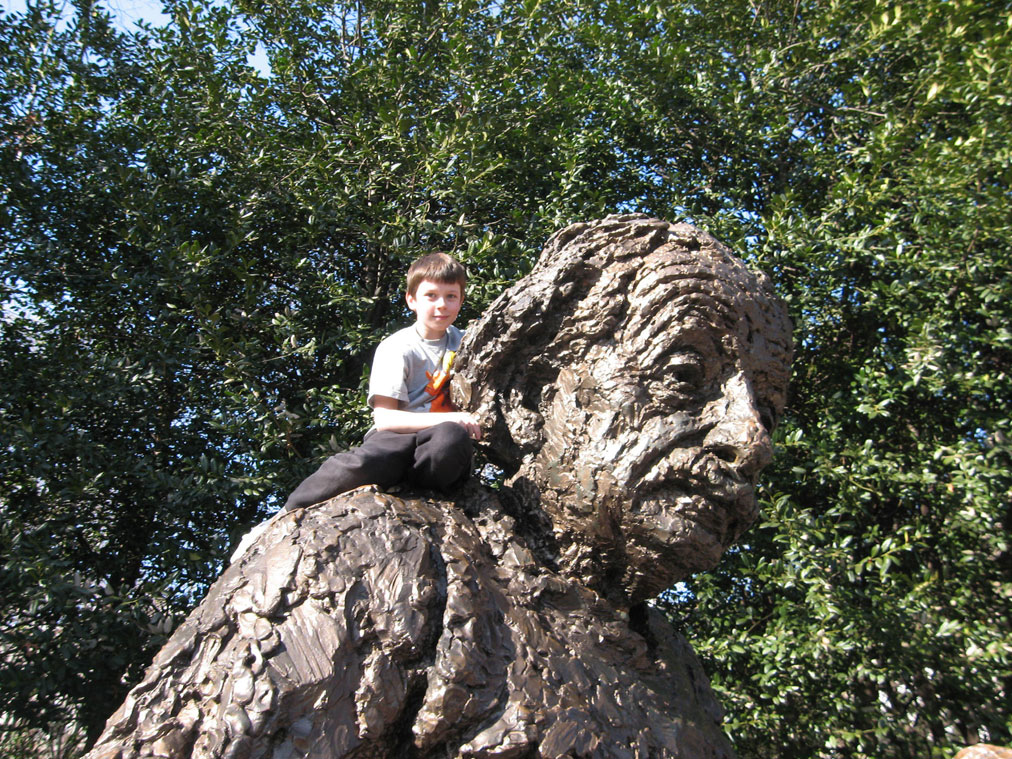Research Project 1: On the Shoulders of Giants
Two-Page Timeline, Presentation and Annotated References
If I have seen further it is only by standing on ye shoulders of
giants.
[Isaac Newton in a Letter to Robert Hooke, dated
5 February 1675]

Einstein and Leisureguy's (Michael Han) grandson. Posted
March 23, 2007.
http://leisureguy.wordpress.com/2007/03/23/on-the-shoulders-of-giants/
You may work alone or with one other person.
Choose a topic related to breakthroughs and controversies in science and/or mathematics.
This may be a topic we have previously explored or a new topic.
You have considerable freedom in choosing the topic.
For example, this may be a process, like cloning, an object, like the microscope, a person, like Einstein, a theme or idea, or more,
as long as some related material is still of interest today.
Two-Page Timeline
Research and then create an attractive and publication-quality historical timeline
that explores the interesting and important
breakthroughs and controversies that relate to science and/or
mathematics - not the entire history.
Be sure that the timeline is in your own words and includes
important contributions from diverse scientists or mathematicians around
the world,
noting what kind of scientist and where they are from, as
well as interesting pictures, and that the scientific and/or mathematical
connections are clear.
Approximate dates can be noted as ~1762 or by a range of dates, such
as 1700-1800.
A maximum of two-pages will be allowed (not including references). If you can, also include some modern connections or future work.
Annotated Bibliography
Use many different types of sources, including scholarly references
and library sources.
Submit a separate annotated bibliography of all
of the sources you used in the timeline, with annotations explaining
how you used each reference in your timeline, where the pictures came from,
etc. Use as many pages as you need for the annotated bibliography.
Here are some first drafts to give you some ideas. Each have strengths and weaknesses:
Diabetes (I like the way they
included where the people are from and what kind of scientist they are, but the writing could be improved)
The Mathematics, Science and Psychology of Video Games
(Nice highlights of themes via a color-coded key, and annotations on the credibility of the
sources, except the last one. They could have improved that as well as the consistency and writing.)
Research Session Presentations
The presentation sessions are similar to
research day at Appalachian, poster presentations at research conferences,
or science fairs.
Bring a printed version of your timeline and annotated bibliography
to class to post on the wall [I will bring tape].
We will divide the class into two sessions (half the class will
stand next to the timeline as the other half examines them, and then we will
switch roles). During your
session, you must stand by your timeline to discuss your topic
and answer questions.
If you work with another person, they will be in the other session so you should be prepared to present the entire project.
The presentation component typically involves a group of 1 or 2 students at a time listening to your presentation and looking at your project so they can take notes for peer review.
Grading
The project will be graded using this rubric
Connection to the Course Goals
Historical and modern aspects highlight multiple perspectives
Builds research skills
Practices communication skills
Peer review and presentations builds connections to each other
This project connects in a variety of ways to the four general education goals for all students at ASU:
Thinking Critically & Creatively [research and creative product]
Communicating Effectively [writing, speaking and reflecting]
Making Local to Global Connections [how science and mathematics applies in many settings, multiple perspectives]
Understanding Responsibilities of Community Membership [citations, peer review, actively listening to each others perspectives and presentations...]
References and Suggestions
Library Research
Catalog searches on a topic or the history of a field,
or a search in a library database such as Academic Search Premier on
history of cloning
can provide a wealth of historical information.
Specialized journals also exist, such as
Journal of the History of Biology,
Historia Mathematica, or
Nursing History Review,
the official publication of the American Association for the History of
Nursing,
and these can be searched for in the library
databases.
More general searches can also result in interesting perspectives, such as:
The library database CQ Researcher presents a chronology
for select topics
and questions.
Academic or Professional Websites and Google Scholar Archives such as the
Physics History Network
(American Institute of Physics),
History of Psychology (Pozella)
and the
MacTutor History of
Mathematics (O'Connor and Robertson)
can provide extensive
collections articles on particular people and topics.
Websites such as the
Earliest Known Uses of
Some of the Words of Mathematics (Miller)
History of the
Origin of the Chemical Elements and Their Discoverers (Holden),
or History and Philosophy of Biology Resources (Millstein)
can provide history on the development as well as the first published
appearance of terms.
More generally, the
Stanford Encyclopedia of Philosophy
or Wikipedia's historical information can also be helpful, but be careful about reliability.
Some topic searches may yield many unrelated pages or be too general
a search. However, modifying a web search to include quotations
such as "history of cloning" or "timeline of cloning"
may provide more useful information. These types of searches can
result in many different timelines, such as
A Brief
History of Exercise Science (Entin)
or Pfizer
Timeline (Pfizer, an American pharmaceutical corporation)
Google Scholar can help too, especially with recent breakthroughs.
As always, I am happy to help and
if you choose a mathematical topic,
I have many historical books in my office, including one I published.
Revision Opportunity
After you have presented your timeline and received feedback from the class,
you will have the opportunity to improve your timeline and
references [and your grade]. The revised timeline may be three
pages instead of two.
